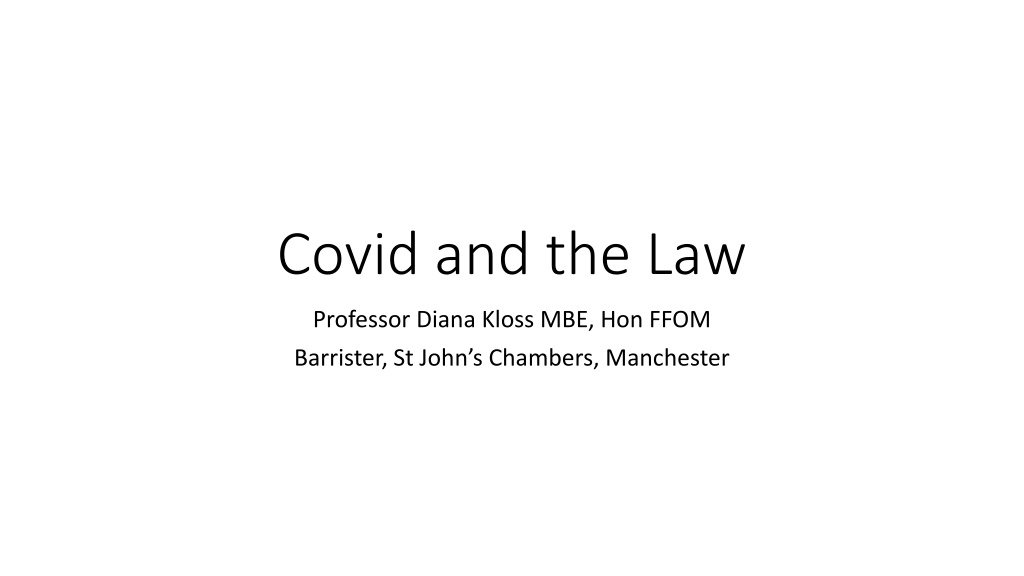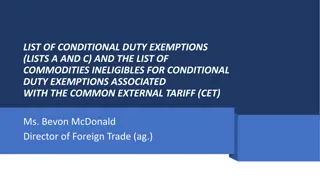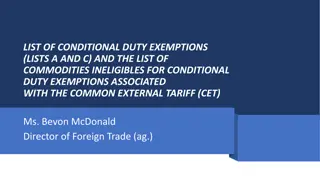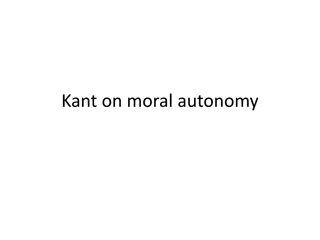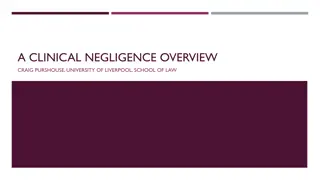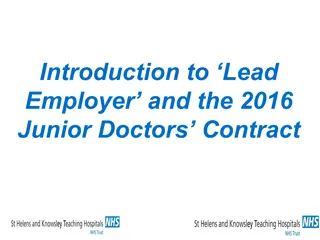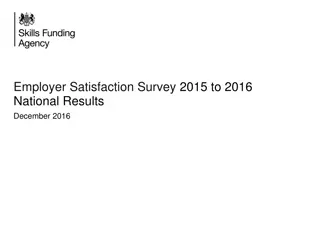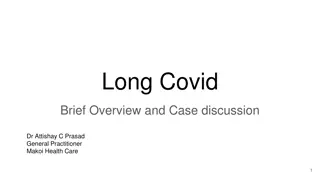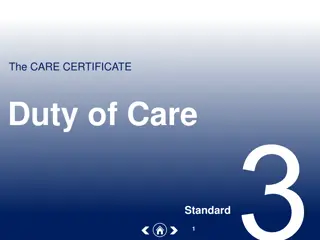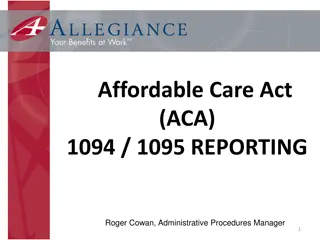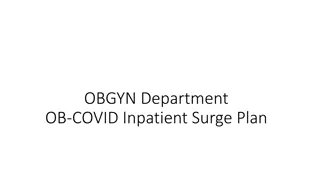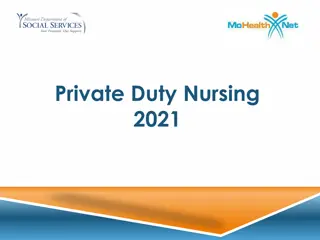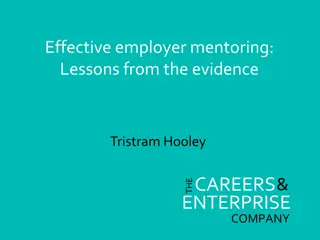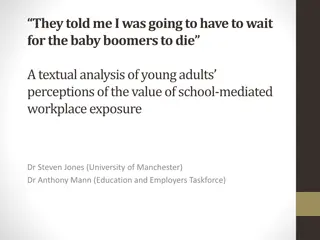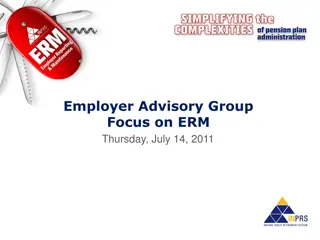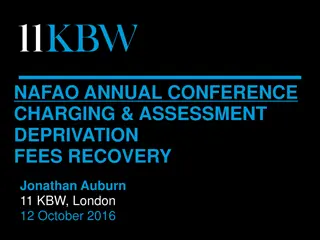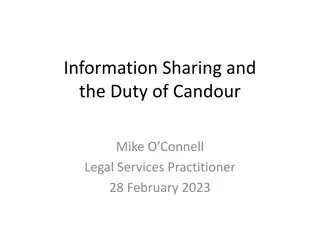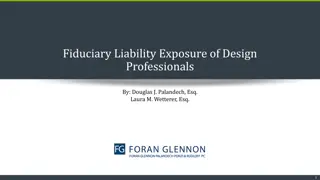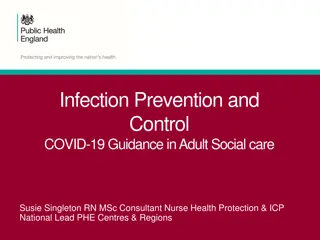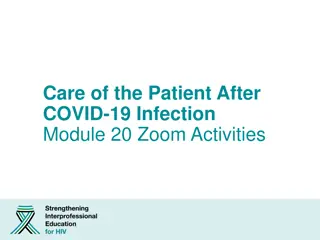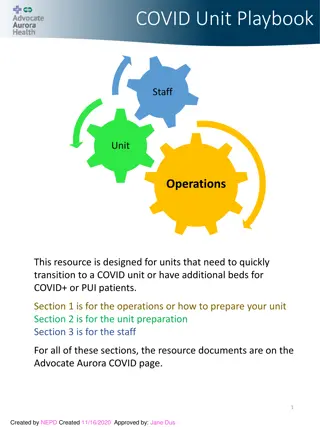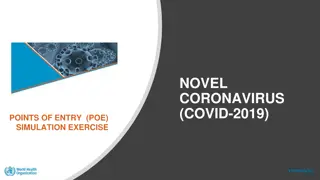Employer’s Duty of Care in the Context of Covid-19
Employers have a legal duty of care towards their employees, patients, and visitors to ensure physical and mental wellbeing, especially during the Covid-19 pandemic. This duty encompasses both criminal and civil laws, involving measures such as risk assessments, safety procedures, provision of personal protective equipment, and support for mental health. The employer's responsibilities extend to those working from home or on furlough, requiring effective communication and assistance to maintain a safe working environment.
Download Presentation

Please find below an Image/Link to download the presentation.
The content on the website is provided AS IS for your information and personal use only. It may not be sold, licensed, or shared on other websites without obtaining consent from the author. Download presentation by click this link. If you encounter any issues during the download, it is possible that the publisher has removed the file from their server.
E N D
Presentation Transcript
Covid and the Law Professor Diana Kloss MBE, Hon FFOM Barrister, St John s Chambers, Manchester
Employers Duty of Care This is a duty imposed both by the CRIMINAL and the CIVIL Law. It is a duty owed both to employees and third parties who are at foreseeable risk (eg employees of contractors, patients, visitors to the employer s site). It is a duty to protect both physical and mental health and a duty to take reasonable care to prevent foreseeable damage CRIMINAL LAW: Health and Safety at Work Act 1974 and Regulations made thereunder eg Management Regulations, COSHH Regulations, PPE Regulations The criminal law is enforced by the Health and Safety Executive and local authorities, which inspect, issue notices and may prosecute in the criminal courts
Employers Duty of Care CIVIL LAW: This is common law, enforced by action taken by a victim in the civil courts Claimants must finance their own action, usually via a conditional fee A successful claim gives the right to an award of money damages paid to the victim or his/her family NHS employees, but not NHS Trusts, have statutory indemnity against clinical negligence claims. The indemnity has been extended to those providing services to the NHS to help to cope with the emergency
Covid and the Duty of Care An employer may be guilty of a criminal offence and/or be liable to pay damages where: It has failed to take reasonable care of its employees or patients/contractors/visitors: By not making an adequate risk assessment; By not instituting safety procedures like social distancing, hygiene; By not providing effective personal protective equipment; By not taking precautions to exclude those infected; By not caring for the mental health of its employees ..
Employers duty of care to those working from home or furloughed The employer owes a duty of care to protect the physical and mental health of those working from home or furloughed Communication is vital, and a route whereby the worker at home can seek assistance in the event of problems and difficulties The Display Screen Equipment Regulations 1992 extend to home working but not where this is only temporary (?). However, employers should be prepared to assist with setting up safe work stations and where the employee has a disability may have a duty to purchase equipment as a reasonable adjustment
Manslaughter Gross negligence manslaughter is a common law crime of killing a human being by an act or omission of an individual which is not just ordinarily careless; it must be reckless or grossly careless R v Bawa Garba (2016) Corporate manslaughter cannot be committed by an individual but only by a corporate body eg an NHS Trust. The senior management of a corporate body must be proved to be in gross breach of its duty of care to employees and/or third parties, causing a death Corporate Manslaughter and Corporate Homicide Act 2007
RIDDOR 2013 The employer has a duty to report work-related diseases and injuries to the HSE in certain circumstances: (i) infection or death attributed (on a balance of reasonable probabilities) to any disease related to an occupational exposure to a biological agent where there is a diagnosis in writing by a doctor; (ii) where there has been a dangerous occurrence giving rise to a likely occupational exposure to a biological agent, eg the breaking of a flask containing the virus in a laboratory
Can an employee refuse to attend the workplace if required to do so by the employer? Section100 Employment Rights Act 1996 An employee is automatically unfairly dismissed if, in circumstances of danger which they reasonably believe to be serious and imminent, and which they cannot reasonably be expected to avert, they left, proposed to leave or (while the danger persisted) refused to return to their workplace No need to prove 2 years minimum service and no upper limit on the amount of a compensatory award Employee will need to prove more than just concern about the virus. They must prove that their particular workplace was especially hazardous (eg negligent employer)
Does this only protect employees? Section 44 Employment Rights Act 1996 was amended 31 May 2021 to protect both employees and workers against detriment/dismissal in a section 100 type case ERA 1996 (Protection from Detriment in Health and Safety Cases) (Amendment) Order 2021
Should workers who are especially vulnerable (shielded) be treated differently by the employer? If a worker has a disability as defined by the Equality Act 2010 the employer has a duty to make adjustments, which might mean allowing them to work from home or giving them furlough, holiday, unpaid leave, depending on what is held reasonable The employer has a duty to protect the health of pregnant women under the Management Regulations 1999 and to find alternative work/pay maternity suspension pay to those unfit for work because of risk to mother or baby The employer s duty of care involves taking more precautions for someone known to be especially vulnerable OH has an important role in advising both employers and employees about Covid vulnerability. See Covid age assessment tables
Should a vulnerable employee be permitted to attend the workplace if they wish to do so? The employer should, as always, perform a risk assessment OH should be asked to assist by advising on the degree of vulnerability and reasonable adjustments to reduce the risk My view is that the wishes of a vulnerable employee should be taken into account. If the employee is fully informed of the risk and is willing to take it this is a relevant consideration when performing the risk assessment Withers v Perry Chain Ltd (1961) The ultimate decision is for the employer, not OH
Should workers who live with clinically vulnerable relatives be given special treatment? There is no duty of reasonable adjustment under the Equality Act for the non-disabled carers of disabled relatives Hainsworth v MOD (2013) There is a right to ask for flexible working in the Employment Rights Act 1996 but the employer can refuse if for a good business reason If the employer negligently infects a worker with the virus while they are at work and the worker brings the virus home and infects a vulnerable relative (compare asbestos fibre) the employer might be liable but it would be difficult to prove that the virus was contracted in the workplace due to negligence and not in the shop or on the bus
Return to the workplace post lockdown Employers should undertake fresh risk assessments They should be aware of the increased likelihood of mental health problems They should communicate with employees and be flexible They should be aware of problems with Long Covid In some cases Long Covid may be a disability under the Equality Act: a physical or mental impairment that is long term (already lasted for 12 months or likely to last for 12 months) and has a more than trivial adverse effect on normal day to day activities: duty of reasonable adjustment and protection against disability-related discrimination (s 15 Equality Act)
Is Covid an occupational disease? It is not at present on the list of prescribed diseases that give the right to Industrial Injuries Disablement Benefit Should it be? See IIAC Position Paper 48 (2021) Currently insufficient data to show necessary doubling of risk but some evidence that might be the case in teaching and health and social care Belgium, Denmark, Finland, France, Norway and Spain recognise Covid 19 as an occupational disease giving the right to employees in some jobs to claim compensation
Confidentiality and data protection Under the GDPR and the Data Protection Act 2018 both the employer and OH must have a lawful basis for collecting and holding personal data concerning: Covid vulnerability scores; Results of Covid tests; Infections with Covid; Vaccinations As this is health (special category) data there must be a lawful basis under both Article 6 and Article 9 GDPR
Lawful bases Both NHS Trusts and OH services are likely to use Article 6 (1)(e) GDPR: processing is necessary for the performance of a task carried on in the public interest or in the exercise of official authority vested in the controller NHS employers are likely to use Article 9 (2) (b) GDPR: Processing is necessary for the purposes of carrying out the obligations and exercising specific rights of the controller or of the data subject in the field of employment, social security and social protection law .or (h): provision of social care or treatment or management of health or social care systems or services .or (i) for reasons of public interest in the area of public health
OH lawful basis OH are likely to use Article 9(2)(h) as a lawful basis: Processing is necessary for the purposes of preventive or occupational medicine, for the assessment of the working capacity of the employee, medical diagnosis, the provision of health or social care or treatment or the management of health or social care systems or services ..but subject to paragraph 3: the data must be processed by or under the responsibility of a professional subject to the obligation of professional secrecy or another person also under an obligation of secrecy .
Health professionals must also obey the common law and ethical duty of confidence Confidential information should not be disclosed to the employer or other third parties without the consent of the patient EXCEPT With informed consent By order of a court or tribunal or regulator (eg GMC, NMC, CQC, HSE) In the public interest Where there is a specific statutory exemption eg Public Health Act See Health Service (Control of Patient Information) Regulations 2002 The Secretary of State can issue COPI notices (he has issued 4) requiring NHS organisations to process confidential patient information for purposes related to communicable diseases without having to obtain consent
What purposes are covered by the COPI notices? Understanding Covid 19 and risks to public health, trends in Covid 19 and such risks, and controlling and preventing the spread of Covid 19 and such risks Identifying and understanding information about patients or potential patients with Covid 19 Delivering services to patients, clinicians, the health services Research and planning in relation to Covid 19 The current notices are due to expire on 30 September 2021
COPI notices and OH NHS managers need to be reminded that though they have the right of access to patient records they do not in general have the right of access to OH records of their employees In many cases public interest justifies the disclosure of confidential information without consent by OH to an employer during a pandemic, for example that an employee has tested positive However, care should be taken not to disclose more information than is necessary eg full clinical details of an employee who is particularly vulnerable
Mandatory testing/vaccination? An employer can never lawfully physically force an employee to undergo testing/vaccination. Health professionals must always obtain consent to testing/vaccination otherwise they are committing a battery. The only exception may be someone who lacks capacity to consent where treatment can be given without consent in that person s best interests: Mental Capacity Act 2005 Parliament can impose a legal obligation on employees to undergo vaccination if they want to be allowed to work: no jab, no job See Health and Social Care Act 2008 (Regulated Activities) (Amendment) (Coronavirus) Regulations 2021: employees in care homes must be vaccinated from November 11 2021 (with exceptions)
Can an employer make testing/vaccination mandatory? There is arguably an implied term in contracts of employment of health professionals that they will submit to testing if reasonably required by the employer in the interests of the health and safety of colleagues and patients Bliss v SE Thames RHA (1985) Also, if the imposition of testing is necessary to check whether an employee is fit to work the employer may rely on their right to issue new safety rules unilaterally Dryden v Greater Glasgow Health Board (1992)
Mandatory vaccination? My view is that an employer would need to rely on an express term, which means that only new employees (not existing employees) could be forced to comply There would also need to be exemptions for those with a condition that makes vaccination more risky There will be arguments that compulsory vaccination is a breach of human rights but the protection of health and the rights of others are recognised exceptions. Compare mandatory drug/alcohol testing? NB FOM has stated that it is opposed to mandatory vaccination but some OH physicians have objected that it is not the Faculty s role to advise employers on ethics (!)
